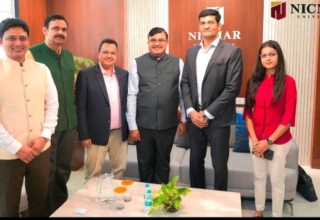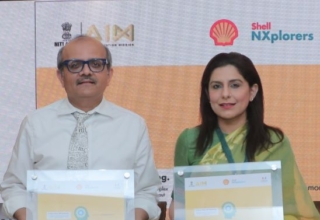“What is special today, will be common tomorrow,” says Jim Tung, Fellow at the US-based MathWorks (esb 1984), a company that develops the popular mathematical computing software/language, Matlab, used by engineers and scientists for algorithm development, data analysis, visualization, and numeric computation along with Simulink to accelerate their works in innovation and development. With his association going for more than two decades with the world’s leading company in its genre, Jim’s words about future world should sound prophetically believable. Autonomous systems (Automation of connected things) has already hit the roads with driver less vehicles (robots and drones are other examples) and one after another the older and existing engineering architecture will crumble to pave a way for new order based on big data, artificial intelligence, IoT and other embedded enterprising systems for cost, ease and speed. And it would be a cascading race world over to claim ‘we did it.’
In this future world, which has already dawned upon the human civilization, the fundamental question is what role humans are going to play in this rapidity, because it will be still the humans who will be instrumental and responsible to make this happen. And certainly education will have to provide the answers. Software already is an indispensible part of mechanical systems today and use of codes is ever on increase.
Jim, who was in India as a key note speaker for this year’s MathWorks Annual MATLAB EXPO held at three locations in India (Hyderabad, Bangalore and Pune) in April that brought more than 2200 engineers, scientists, students and researchers together to discuss “Autonomous Anything” and also learn more about latest in MATLAB and Simulink product families of MathWorks, says that computational thinking would be a skill most in demand. “There is a wrong tendency to see learning of coding as a means to an end. In reality, this has to become a lifelong learning because as numeracy or literacy, this is going to be necessary skill any time soon. And educators and curriculum framers have to realize the critical importance of problem solving, logical thinking and use of patterns for algorithms or what we call computational thinking for future challenges as computational thinking will become a fundamental skill for everyone,” he adds.
How do we teach computational thinking in schools and colleges? According to Jim, see how we go about teaching mathematics—systematically and regularly with increasing difficulty levels and in the same fashion, computational thinking has to progress in a continuum beginning from school itself. The good news for schools in India is that MathWorks has introduced a school product in India this year for primary and secondary students to help them develop the aptitude for skills and construct codes. The product licence is very cheap at about Rs 35000 a year for a school. And this will be start of a new movement in school education as young minds join the course for innovative applications.
“Our focus in India so far has been higher education mainly engineering colleges and science institutions, but from this year onward we’ll be actively engaged in school segment as well and hope to bring about a perceptional change for tomorrow’s world in children,” adds Jayant Bhadauria, sales director Education. Used by over 5000 universities across the world, Matlab from MathWorks, which is the language of technical computing—a programming environment for algorithm development, data analysis, visualization, and numeric computation, is also popular with India’s top engineering colleges. “In fact all the top 30 ranked engineering colleges in NIRF rankings 2017 use Matlab and both students as well as faculty finds Matlab highly useful,” adds Bhadauria. Simulink allows simulations of wireless, communications and other technologies for generating scenarios and controls. MathWorks which established its India office in 2008 has a development facility in Bangalore and apart from servicing a host of high end industries; it has developed a rapport with technical institutions in India by way of facilitating industry-academia interfaces, internships and an annual academic summit. Many engineering college campuses in India are today Matlab and Simulink enabled, which is providing their students all the advantages of the very latest advances in the field of computing, data analysis, designing and simulations.
Viju Ravichandran, who is working as the Education Technical Evangelist at the MathWorks India is of the view that awareness about computational thinking and use of advanced tools and languages such Matlab is very critical for progress of engineering education in India. “Our core engineering skills and knowledge have to be globally comparative and even best to meet our own challenges. Keeping in view this, we have made access to our products easy, we also conduct awareness workshops, conduct faculty training and of late there is a lot of interest among people as the narrative of artificial intelligence spreads,” he says.
Suggesting that there is a clear shift in education towards the new paradigm of going to learning to learn, Jim cites how bytes and beats program in USA is making classroom music interesting and acceptable with codes. MathWorks also supports a lot of student contests such as robotics and others ways to generate interest about logical thinking and patterns in student community. “Our research and development is for whole world and we have an all-round emphasis on education where we partner in STEM related activities,” he adds.
The next generation engineering designers are going to be vastly different from the present as data generation, recording, manipulation, testing and modelling with embedded connectivity and artificial intelligence surpassing human capability will vastly change the whole scenario from concept to execution. The system complexity will increase, so will the computing power, functional safety will be a big thing for controlling software. There will be a continuous growth of electronics. Precast assembly will be preferred mode of development and so on and so forth. In nutshell, the mesh of data, the power of data science and use of machine intelligence, will define the system architecture of engineering works. “The army of programmers will not be needed for writing codes, rather it would be the creative thinking or smart way of putting together things that would available,” says Jim.
Improving quality, reducing cost and time will call for working on actionable data by enterprises as they rebuild their models. The value addition is going to be highly valued. And, tomorrow’s world waits for problem solvers empowered with skills and understanding of using software tools and applications like that of MathWorks!
Filed By Autar Nehru who attended MATLAB EXPO at Pune










